188 books for « herzen h »Edit
-
Language
English (1)
French (113)
Russian (74)
-
Century
19th (11)
20th (46)
21st (3)
-
Countries
Belgium (10)
Canada (1)
France (77)
Germany (1)
Greece (1)
Italy (1)
Netherlands (3)
Switzerland (16)
United States of America (78)
-
Syndicate
ALAC (1)
ILAB (42)
NVVA (8)
SLACES (5)
SLAM (34)
Topics
- Aesthetics (1)
- Africa (1)
- Alchemy (1)
- Autographs (1)
- Biology (1)
- Brain (1)
- Communism (4)
- Communism (3)
- Education (1)
- Einstein (2)
- England (1)
- Engraving (books about) (2)
- Epistemology (2)
- Esotericism (3)
- Ethic (3)
- First edition (2)
- Geometry (1)
- Helvética (1)
- Hermeticism (2)
- History (6)
- India (1)
- Italian (1)
- Italy (1)
- Literature (8)
- Medicine (3)
- Meditation (1)
- Methodology (1)
- Monod théodore (1)
- Morphology (3)
- Mountain (1)
- Orientalism (1)
- Pathology (1)
- pharmacology (6)
- Philosophy (11)
- Physics (1)
- Physiology (5)
- Poetry (1)
- Policy (1)
- Psychoanalysis (1)
- Psychology (3)
- Religions & spirituality (1)
- Review (1)
- Russia (12)
- Russian literature (1)
- Savoy (1)
- Sciences (5)
- Socialism (4)
- Switzerland (1)
- Symbolism (2)
- Therapy (8)
- Translation (1)
- Various (2)
Kontsy i nachala. S predisloviem avtora.
Norrkoeping, Eric Biornström, (below, on printed cover: En Commission - Londres, Trübner & Co), 1863. (2), iv, (2, blank), 96 pp. 8vo. Modern boards, original covers preserved. Anderson 302; Kilgour 436; Zaleski 197. First separate edition: Herzen's letters to Turgenev, which first appeared in My Past and Thoughts, published here with a new introduction. 'Herzen's renewed interest in Russia's past and future was closely linked to his bitter disappointment in the "old world". He was a discerning critic of bourgeois society, even if his strictures were not always fair. The modern reader is struck especially by certain far-sighted observations, that seem to anticipate criticism of a complex phenomenon we have come to refer to as "mass culture". Herzen's most interesting comments in this respect are to be found in a series of articles entitled Ends and Beginnings, in which he conducted a polemic with Ivan Turgenev, who had become the moral authority for liberal Westernizers in Russia' (Andrzej Walicki, A History of Russian Thought, Oxford, Clarendon Press, 1980, p. 170). Alexander Herzen (1812-70) was a prominent nineteenth-century Russian social thinker and is known as the 'father of Russian socialism.' Early in his intellectual development, Herzen was influenced by German idealist thinkers such as Schiller and Schelling. He believed in the autonomy and dignity of the individual and opposed forces, such as family and state, that oppressed the individual. Later, under the influence of French socialist thinkers such as Charles Fourier, Herzen's thought became more radical. Herzen projected his earlier concern for the oppressed individual onto society at large and he became a supporter of socialism. The socialism he envisioned was a loose federation of self-governing communes. Only in such a system could the ideal society be achieved- according to Herzen that society would be a free association of individuals which provided for the full flowering of each personality. Herzen initially placed his hopes for this future order in the European socialist movement. After the failure of the 1848 revolutions to achieve socialist principles, however, Herzen became disillusioned about European prospects and turned his attention to Russia. Herzen argued that socialist transformation would actually come first to Russia because communal institutions such as the peasant commune survived and bourgeois attitudes hadn't yet emerged. This sense of the advantages of Russian 'backwardness' was influential among the Populists in the 1870s. Herzen has been called a 'gentry revolutionary.' The illegitimate son of a wealthy landowner, Herzen viewed the gentry as a progressive class. The revolution he envisioned was for the people but not necessarily by them. Also, his socialism was a national destiny rather than a class one, and because he promoted the value of individualism in collectivist form--in other words, the full flowering of the individual could best be realized in a socialist order. Among Herzen's works are From the Other Shore (1848-50) and The Russian People and Socialism and his autobiography, My Past and Thoughts.He founded a periodical, the famous Kolokol, in whose pages the free word first appeared in the Russian language, unhampered by censor or police, exposing the government's secrets, criticizing bureaucratic abuses, approving the good intentions of the czar, the 'liberator', and trying to dictate to him a reform program.


(NVVA, )
Phone number : 31 20 698 13 75
Kontsy i nachala. S predisloviem avtora.
Norrkoeping, Eric Biornström, (below, on printed cover: En Commission - Londres, Trübner & Co), 1863. (2), iv, (2, blank), 96 pp. 8vo. Sewn in the original yellow printed covers. Anderson 302; Kilgour 436; Zaleski 197. First separate edition: Herzen's letters to Turgenev, which first appeared in My Past and Thoughts, published here with a new introduction. 'Herzen's renewed interest in Russia's past and future was closely linked to his bitter disappointment in the "old world". He was a discerning critic of bourgeois society, even if his strictures were not always fair. The modern reader is struck especially by certain far-sighted observations, that seem to anticipate criticism of a complex phenomenon we have come to refer to as "mass culture". Herzen's most interesting comments in this respect are to be found in a series of articles entitled Ends and Beginnings, in which he conducted a polemic with Ivan Turgenev, who had become the moral authority for liberal Westernizers in Russia' (Andrzej Walicki, A History of Russian Thought, Oxford, Clarendon Press, 1980, p. 170). Alexander Herzen (1812-70) was a prominent nineteenth-century Russian social thinker and is known as the 'father of Russian socialism.' Early in his intellectual development, Herzen was influenced by German idealist thinkers such as Schiller and Schelling. He believed in the autonomy and dignity of the individual and opposed forces, such as family and state, that oppressed the individual. Later, under the influence of French socialist thinkers such as Charles Fourier, Herzen's thought became more radical. Herzen projected his earlier concern for the oppressed individual onto society at large and he became a supporter of socialism. The socialism he envisioned was a loose federation of self-governing communes. Only in such a system could the ideal society be achieved- according to Herzen that society would be a free association of individuals which provided for the full flowering of each personality. Herzen initially placed his hopes for this future order in the European socialist movement. After the failure of the 1848 revolutions to achieve socialist principles, however, Herzen became disillusioned about European prospects and turned his attention to Russia. Herzen argued that socialist transformation would actually come first to Russia because communal institutions such as the peasant commune survived and bourgeois attitudes hadn't yet emerged. This sense of the advantages of Russian 'backwardness' was influential among the Populists in the 1870s. Herzen has been called a 'gentry revolutionary.' The illegitimate son of a wealthy landowner, Herzen viewed the gentry as a progressive class. The revolution he envisioned was for the people but not necessarily by them. Also, his socialism was a national destiny rather than a class one, and because he promoted the value of individualism in collectivist form--in other words, the full flowering of the individual could best be realized in a socialist order. Among Herzen's works are From the Other Shore (1848-50) and The Russian People and Socialism and his autobiography, My Past and Thoughts.He founded a periodical, the famous Kolokol, in whose pages the free word first appeared in the Russian language, unhampered by censor or police, exposing the government's secrets, criticizing bureaucratic abuses, approving the good intentions of the czar, the 'liberator', and trying to dictate to him a reform program.


(NVVA, )
Phone number : 31 20 698 13 75
Le Message de Sri Aurobindo et son Ashram. JOINT Le Centre Universitaire International Sri Aurobindo
Pondichéry, Sri Aurobindo Ashram, 1947, 1953, in-4 (18,5x 24,5cm), broché, 36p., 16 planches / 44p., 54 planches Portrait de Sri Aurobindo et de la Mère en frontispice. Texte sur 36 pages suivi de 16 planches d'illustrations totalisant 32 photographies N/B autour de la vie quotidienne à l'Ashram / Texte sur 44 pages suivi de 56 planches totalisant 65 photographies N/B. Couvertures légèrement défraîchies.
NB Le délai d'acheminement vers la France est de 48h.
Le Message de Sri Aurobindo et son Ashram
Pondichéry, Sri Aurobindo Ashram, 1947, in-4 (18,5x 24,5cm), broché, 36p., 16 planches Portrait de Sri Aurobindo et de la Mère en frontispice. Texte sur 36 pages suivi de 16 planches d'illustrations totalisant 32 photographies N/B autour de la vie quotidienne à l'Ashram. Bon exemplaire
NB Le délai d'acheminement vers la France est de 48h.
Camicia Rossa. La Chemise Rouge. Garibaldi à Londres.
Bruxellles, L. Fontaine Editeur., 1865, in-8, plein bradel papier rouge (pâles taches sur le premier plat), pièce de titre papier, 155 pages. Edition originale. Couverture conservée. Ex. très frais.
NB Le délai d'acheminement vers la France est de 48h.
Shri Aurobindo.
Paris, Cahiers du Sud, 1954, in-8, broché, 470p. Bon exemplaire. Frais et sans annotations.
NB Le délai d'acheminement vers la France est de 48h.
Lettres de France et d'Italie (1847-1852). Traduit du Russe par Mme N(atalie) H(erzen). Édition des enfants de l'auteur.
Genève, 1871. xvi, 311, (1) pp. 8vo. Modern half morocco, original covers preserved. Zaleski 79; not in Catalogue Russica. First French edition. Alexander Herzen (1812-70) was a prominent nineteenth-century Russian social thinker and is known as the 'father of Russian socialism.' Early in his intellectual development, Herzen was influenced by German idealist thinkers such as Schiller and Schelling. He believed in the autonomy and dignity of the individual and opposed forces, such as family and state, that oppressed the individual. Later, under the influence of French socialist thinkers such as Charles Fourier, Herzen's thought became more radical. Herzen projected his earlier concern for the oppressed individual onto society at large and he became a supporter of socialism. The socialism he envisioned was a loose federation of self-governing communes. Only in such a system could the ideal society be achieved- according to Herzen that society would be a free association of individuals which provided for the full flowering of each personality. Herzen initially placed his hopes for this future order in the European socialist movement. After the failure of the 1848 revolutions to achieve socialist principles, however, Herzen became disillusioned about European prospects and turned his attention to Russia. Herzen argued that socialist transformation would actually come first to Russia because communal institutions such as the peasant commune survived and bourgeois attitudes hadn't yet emerged. This sense of the advantages of Russian 'backwardness' was influential among the Populists in the 1870s. Herzen has been called a 'gentry revolutionary.' The illegitimate son of a wealthy landowner, Herzen viewed the gentry as a progressive class. The revolution he envisioned was for the people but not necessarily by them. Also, his socialism was a national destiny rather than a class one, and because he promoted the value of individualism in collectivist form--in other words, the full flowering of the individual could best be realized in a socialist order. Among Herzen's works are From the Other Shore (1848-50) and The Russian People and Socialism and his autobiography, My Past and Thoughts.He founded a periodical, the famous Kolokol, in whose pages the free word first appeared in the Russian language, unhampered by censor or police, exposing the government's secrets, criticizing bureaucratic abuses, approving the good intentions of the czar, the 'liberator', and trying to dictate to him a reform program.


(NVVA, )
Phone number : 31 20 698 13 75
Textes philosophiques choisis
Editions en Langues Etrangères, Moscou Malicorne sur Sarthe, 72, Pays de la Loire, France 1956 Book condition, Etat : Bon relié, cartonnage éditeur pleine percaline, bordeaux et blanc, illustré d'un portrait de A. Herzen en médaillon fort et grand In-8 1 vol. - 663 pages
1 photographie de A. Herzen en frontispice 2eme édition, 1956 "Contents, Chapitres : V. Lénine : A la mémoire de A. Herzen - Le dilettantisme dans la science - Lettres sur l'étude de la nature - Extraits du journal - A propos des cours publics de M. Granovski - Les cours publics de M. Le professeur Roulier - De l'autre rive - Le peuple russe et le socialisme, lettre à Jules Michelet - Lettre à Alexandre Tchoumikov - La jeune Moscou, extrait des Mémoires et pensées - Lettres à un adversaire - Lettre à son fils Alexandre Herzen - A un vieux camarade - Notes et index - Alexandre Ivanovitch Herzen, né le 25 mars 1812 (6 avril dans le calendrier grégorien) à Moscou et mort le 9 janvier 1870 (21 janvier dans le calendrier grégorien) à Paris, est un philosophe, écrivain et essayiste politique occidentaliste russe. Connu comme le « père du socialisme populiste russe », il est considéré comme un inspirateur du climat politique qui a mené à l'abolition du servage de 1861. - Il reçoit une éducation aristocratique, développant une sensibilité précoce aux idées révolutionnaires et un caractère impétueux. Le soulèvement des décabristes, en décembre 1825, est un événement-clé dans la vie de Herzen. « Les récits du soulèvement, du procès, de l'épouvante qui régnait à Moscou, me firent une très forte impression ; un monde nouveau m'était révélé, vers lequel convergeait de plus en plus ma vie intérieure. Je ne sais comment cela se fit, mais tout en comprenant peu, ou de façon vague, ce que tout cela signifiait, je sentais que je ne me trouvai pas du côté de la mitraille et de la victoire, de la prison et des chaînes. L'exécution de Pestel et de ses camarades tira définitivement mon âme de son sommeil d'enfant. » Herzen entre à l'université de Moscou en 1830. Arrêté le 9 juillet 1834 (21 juillet dans le calendrier grégorien), il est jugé et subit un bannissement à Perm et à Viatka de 1834 à 1838. En mars 1838, il revient clandestinement à Moscou et, le 9 mai 1838, il épouse Natalie Zakharine. En 1841, il s'installe à Saint-Pétersbourg, où il continue sa carrière de fonctionnaire. Il redevient suspect et se retrouve bientôt à Novgorod avec sa femme et leurs deux enfants ; l'un d'eux Alexandre A. Herzen devient professeur de physiologie à Lausanne. Il passe la frontière russe le 19/31 janvier 1847 et s'installe à Paris, où il collabore avec Proudhon. Il part en Italie en octobre. En février 1848, il est à Rome, où il apprend les événements de 48. Il revient précipitamment à Paris. Outre l'échec politique de la révolution, il vit alors plusieurs épisodes personnels douloureux. D'abord, sa femme Nathalie, délaissée pour la politique, prend comme amant le poète allemand, Georg Herwegh (le couple ne se réconcilie qu'en 1851), puis en 1851, la mère de Herzen et l'un de ses fils se noient dans un naufrage au large des îles de Lérins. Le 2 mai 1852, c'est son épouse qui meurt de tuberculose. Parti de Paris pour Londres, le 25 août 1852, il vit entre Genève, Nice et Paris. Patriote, il s'occupe principalement de combattre le régime tsariste par ses articles dans L'étoile polaire (1857-65). De 1857 à 1865, avec Nikolaï Ogarev, il publie Kolokol (La Cloche), journal d'inspiration socialiste libertaire et visant la cause révolutionnaire russe. L'intellectuelle Malwida von Meysenbug fait connaître au public allemand les travaux d'Alexandre Herzen en tant que militant politique et écrivain. Dans les années 1860, il rencontre à plusieurs reprises l'écrivain Fiodor Dostoïevski, qui le tenait en haute estime. Malgré la censure, ses articles ont un grand impact en Russie, notamment sur Pierre Kropotkine, qui décrit, dans ses mémoires, la lecture de L'Étoile polaire comme un élément l'ayant poussé à la réflexion politique. Mort à Paris le 9 janvier 1870 (21 janvier dans le calendrier grégorien), juste avant la Commune, il repose à Nice au cimetière du château. (source : Wikipedia)" bon exemplaire, frais et propre, papier à peine jauni
Herzen A.I. The Works of A.I. Herzen: A Complete Set of Eleven Books: in Ten Vol
Herzen A.I. The Works of A.I. Herzen: A Complete Set of Eleven Books: in Ten Volumes with Attachment to a Collection of Postmortem Articles. In Russian (ask us if in doubt)/Gertsen A.I. Sochineniya A.I. Gertsena: Polnyy komplekt odinnadtsati knig: v desyati tomakh s prilozheniem sbornika posmertnykh statey. Short description: In Russian (ask us if in doubt).With a Foreword. Oeuvres dAlexandre Herzen Geneva Basel Lyon: H. Georg Imp. russe A. Troussoff 1875-1879 1904. First collection of essays.
GLI ANIMALI MARTIRI I LORO PROTETTORI E LA FISIOLOGIA UDIENZA PUBBLICA DEL TRIBUNALE CIVILE DELLA RAGIONE
FIRENZE ANDREA BETTINI LIBRAJO EDITORE 1874
Originale pubblicazione del 1874 scritta in forma di udienza del medico e fisologo russo Alessandro Herzen (1839-1906) figlio del noto populista russo. Nell'opera Herzen difende la pratica della vivisezione portando documenti e argomentazioni a suo favore. In discrete condizioni. Copertina editoriale in mediocri condizioni generali con usure e mancanze ai margini e dorso. Legatura quasi assente. All'interno le pagine si presentano in ottime condizioni con rare fioriture. In 8. cm 19x14. Pp. (4)+115.Original pamphlet of 1874 written in form of trial by the russian physician and physiologist Alessandro Herzen (1839-1906) son of the famous russian populist. In the work Herzen defends the practice of vivisection with documents and issues in its favour. In fair conditions. Editorial cover in poor general conditions lightly worn and lackings in the extremities. Binding almost lacks. Inside pages are in very good conditions with occasional foxing. In 8. cm 19x14. Pp. (4)+115.
Principes de morphologie générale : Par Édouard Monod-Herzen,... Tome 2. Matière vivante, morphologie humaine, esthétique. 2e édition [Unknown Binding] Monod-Herzen, Edouard
BROCHE EN SUPER ETAT. PAGES NON COUPEES. Principes de morphologie générale : Par Édouard Monod-Herzen,... Tome 2. Matière vivante, morphologie humaine, esthétique. 2e édition Monod-Herzen, Edouard GAUTHIER-VILLARS 1957. 172 PAGES.
Merci de nous contacter à l'avance si vous souhaitez consulter une référence dans notre boutique à Authon-du-Perche.
Herzen A.I. Works by A.I. Herzen and Correspondence with N.A. Zakharinoy. In Se
Herzen A.I. Works by A.I. Herzen and Correspondence with N.A. Zakharinoy. In Seven Volumes. Volume I. In Russian /Gertsen A.I. Sochineniya A.I.Gertsena i perepiska s N.A.Zakharinoy. V semi tomakh. Tom I. Stories, Stories and Novels. Who is to blame: Forty-Thief: Notes by a Young Man, etc. St. Petersburg Edition by F. Pavlenkov. 1905. 495s. We have thousands of titles and often several copies of each title may be available. Please feel free to contact us for a detailed description of the copies available. SKUalb3317914f170d4c60.
Herzen A.I. Works by A.I. Herzen with a foreword in 10 volumes. Volumes I, II,
"Herzen A.I. Works by A.I. Herzen with a foreword in 10 volumes. Volumes I, II, IV, V. In Russian /Gertsen A.I. Sochineniya A. I. Gertsena s predisloviem v 10 tomakh. Toma I, II, IV, V. Geneve-Bale-Lyon: H.Georg, Libraire-Editeur Imp. russe, A. Troussoff. 1875-1878, XXIII, 1, 383 p.; 6, 368 p.; 4, 393, 2 p.; 6, 351 p., (21.5x13.5 sm.). We have thousands of titles and often several copies of each title may be available. Please feel free to contact us for a detailed description of the copies available. SKUalb8751330d3cedfd8d."
Herzen A.I. Works by A.I. Herzen with a foreword. Volume I. Diary. Dilentantism
Herzen A.I. Works by A.I. Herzen with a foreword. Volume I. Diary. Dilentantism in Science. Buddhism in Science. In Russian (ask us if in doubt)/Gertsen A.I. Sochineniya A.I.Gertsena s predisloviem. Tom I. Dnevnik. Dilentantizm v nauke. Buddizm v nauke.. E6
Herzen A. I. Works by A. I. Herzen. In 10 volumes. Complete set in 10 bindings.
Herzen A. I. Works by A. I. Herzen. In 10 volumes. Complete set in 10 bindings. In Russian (ask us if in doubt)/Gertsen A. I. Sochineniya A. I. Gertsena. V 10-ti tomakh. Polnyy komplekt v 10-ti perepletakh. Short description: In Russian (ask us if in doubt).Plus a collection of posthumous articles. Editions 2. 1874. 4 + 312s. We have thousands of titles and often several copies of each title may be available. Please feel free to contact us for a detailed description of the copies available. SKUalb8438144a5036ade9
A.I.Gertsen ob ateizme, religii i tserkvi. In Russian /A.I.Herzen on Atheism,...
Short description: In Russian. Herzen, Alexander Ivanovich. A.I.Herzen on Atheism, Religion and the Church. Moscow: Thought, 1976. A.I.Gertsen ob ateizme, religii i tserkvi. In Russian /A.I.Herzen on Atheism, Religion and the Church. The image is provided for reference only. It may reflect condition of one of the available copies or only help in identifying the edition. Please feel free to contact us for a detailed description of the copies available. SKU6919406
Herzen A.I. Works by A.I. Herzen and Correspondence with N.A. Zakharyina. In sev
Herzen A.I. Works by A.I. Herzen and Correspondence with N.A. Zakharyina. In seven volumes. Complete set In Russian (ask us if in doubt)/Gertsen A.I. Sochineniya A.I. Gertsena i Perepiska s N.A. Zakharinoy. V semi tomakh. Polnyy komplekt Short description: In Russian (ask us if in doubt).With notes an index and 8 pictures (7 portraits and 1 statue). St. Petersburg: Publishing House of F. Pavlenkova 1905. We have thousands of titles and often several copies of each title may be available. Please feel free to contact us for a detailed description of the copies available. SKUalb824d973a0cad28bc
Gazette des Beaux-Arts Mars 1914. Contient : Edouard Monod-Herzen : gravure originale : Brèche dans la crête des Félouses (Savoie)
Gazette des Beaux-Arts Paris, 1914, brochure in-4, pp.173 à 274, 38 illustrations dans le texte et 6 gravures hors-texte dont : Edouard Monod-Herzen : gravure originale au marteau sur argent : Brèche dans la crête des Félouses (Savoie). Tirage sur beau papier vélin. Protégée par une serpente légendée, la gravure est dans un état parfait. Contient : L'oeuvre d'Hubert Robert en Russie par Louis Réau / Fiorenzo di Lorenzo par Jacobsen / La gravure au marteau par Edouard Monod-Herzen / Les fresques romanes de Brinay par André Humbert / Toyokuni et Hiroshighé par Lemoisne / L'exposition espagnole de Londres par Bertaux. Edouard Monod-Herzen (1873-1963), décorateur spécialisé dans les métaux repoussés et martelés et homme de lettres. Ses gravures sont très rares.
Catherine II / Catherine II. Memoirs of lImperatrice Catherine II. Ecrits par e
Catherine II / Catherine II. Memoirs of lImperatrice Catherine II. Ecrits par elle-meme et precedes dune preface par A.Herzen. Notes written by Empress Catherine II herself, with a foreword by A.Herzen. In Russian /Catherine II / Ekaterina II. Memoires de lImperatrice Catherine II. Ecrits par elle-meme et precedes dune preface par A.Herzen. Zapiski imperatritsy Ekateriny II, napisannye eyu sobstvennoruchno, s predisloviem A.Gertsena. Londres: Trubner Cie, 1859. 352 p. We have thousands of titles and often several copies of each title may be available. Please feel free to contact us for a detailed description of the copies available. SKUalb7bb7c0db28585d2a.
Herzen A. Memoires de Limperatrice Catherine II (Memoirs of Empress Catherine I
Herzen A. Memoires de Limperatrice Catherine II (Memoirs of Empress Catherine II.) In French /Herzen A. (Gertsen A.) Memoires de Limperatrice Catherine II ( Vospominaniya Imperatritsy Ekateriny II.) In French. Trubner. 1859. We have thousands of titles and often several copies of each title may be available. Please feel free to contact us for a detailed description of the copies available. SKUalb4030c0df8a18940b.
Herzen A. I. Ogaryov N. P. of December 14 1825 and Emperor Nikolai. Published
Herzen A. I. Ogaryov N. P. of December 14 1825 and Emperor Nikolai. Published by the editors of the North Star. In Russian (ask us if in doubt)/Gertsen A. I. Ogarev N. P. 14 dekabrya 1825 goda i imperator Nikolay. Izdano redaktsiey Polyarnoy zvezdy. Short description: In Russian (ask us if in doubt).On the Book of Baron Corfe. Iskander A.I. Herzen. London. Trubner 1858. XIV 308 2c. We have thousands of titles and often several copies of each title may be available. Please feel free to contact us for a detailed description of the copies available. SKUalb7dfd32a672c8551c
Das Nibelungenlied. Illustrationen von Theodor Herzen.
1993, in-4to, 135 S., reich ill. von Theodor Herzen, signiert von Theodor Herzen,

(SLACES, NVVA)
Phone number : 41 (0)26 3223808
Principes de morphologie générale, Tome 1 : Formes définies, Familles de formes, Formes associées, Forme et fonctionnement, Des cristaux à la matière vivante - Deuxième édition revue et augmentée [Paperback] Edouard Monod-Herzen
BROCHE NE TRES BON ETAT. Principes de morphologie générale, Tome 1 : Formes définies, Familles de formes, Formes associées, Forme et fonctionnement, Des cristaux à la matière vivante - Deuxième édition revue et augmentée Edouard Monod-Herzen Gauthier-Villars, ED .1956. 208 PAGES. COUV ET INTER TRES PROPRE.
Merci de nous contacter à l'avance si vous souhaitez consulter une référence dans notre boutique à Authon-du-Perche.
Lettres de France et d'Italie (1847-1852).. Traduit du russe par Mme N. H. [Natalia Herzen]. Édition des enfants de l'auteur
Genève, Imprimerie Czerniecki, 1871 in-12, XVI pp., 312 pp., toile noire modeste, dos lisse, pièces de titre cerise, tranches mouchetées (reliure de l'époque).
Première édition française. L'originale en russe était parue en 1855 à Londres.Philosophe, critique littéraire et écrivain russe, Alexandre Herzen (1812-1870) fut en Russie le représentant de la "gauche hégelienne". Connu comme "le père du socialisme russe", il fut exilé en raison de ses positions politiques. Il expose dans ses œuvres un socialisme utopique à tendance slavophile.Cachet humide de la bibliothèque de la Bourse du travail de Paris. - - VENTE PAR CORRESPONDANCE UNIQUEMENT
Herzen A. I. Former and Duma (excerpts). In Russian /Gertsen A. I. Byloe i dumy
Herzen A. I. Former and Duma (excerpts). In Russian /Gertsen A. I. Byloe i dumy (otryvki). Foreword by Vl. Putintsev. Notes by N. Antsiferov. Illustrations by the artist A. A. Komissarov. Design by Yu. I. Batov. Moscow. Soviet Russia. 1979. 384 p. We have thousands of titles and often several copies of each title may be available. Please feel free to contact us for a detailed description of the copies available. SKUalbeb33a4436bfcc98b.
 Write to the booksellers
Write to the booksellers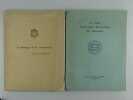
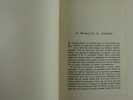
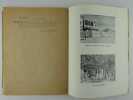

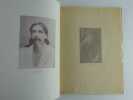
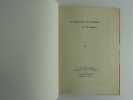

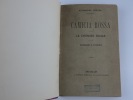
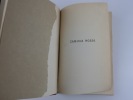
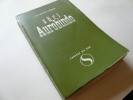
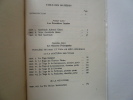
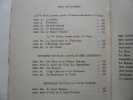

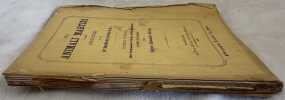











![Lettres de France et d'Italie (1847-1852).. Traduit du russe par Mme N. H. [Natalia Herzen]. Édition des enfants de l'auteur. HERZEN (Aleksander).](https://static.livre-rare-book.com/pictures/CFT/239625_1_thumb.jpg)
![Lettres de France et d'Italie (1847-1852).. Traduit du russe par Mme N. H. [Natalia Herzen]. Édition des enfants de l'auteur. HERZEN (Aleksander).](https://static.livre-rare-book.com/pictures/CFT/239625_2_thumb.jpg)


